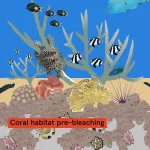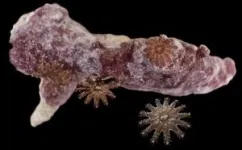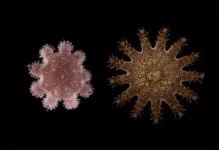(Press-News.org) Research conducted by marine biologists from the University of Sydney has found juvenile crown-of-thorns starfish can withstand tremendous heatwaves well above levels that kill coral. These starfish then develop into carnivorous predators that devour reefs just as they begin to regrow.
Crown-of-thorns starfish are native to the Great Barrier Reef and found in the Indo-Pacific region, but they are classified as a species of concern because the damage large populations cause to coral is more significant than any other species. They fall behind only cyclones and bleaching events in their impact on coral mortality.
New findings suggest the species’ resilience to warming waters could exacerbate the ravaging effect climate change has on coral reefs.
The research is published in the journal Global Change Biology, led by Professor Maria Byrne from the School of Life and Environmental Sciences. She is also a member of the Marine Science Institute and Sydney Environment Institute.
Over the course of the experiment, juvenile crown-of-thorns displayed a surprisingly high heat tolerance, higher than that observed in their adult counterparts. This means that, even if the coral-eating adult stage declines in climate change-driven ocean warming scenarios, perhaps from a lack of their coral prey or from the heat, their herbivorous young can wait patiently for the opportune moment to grow into carnivores.
Coral bleaching and death can be triggered when waters warm by 1-3 degrees Celsius above the normal summer maximum, depending on how long the temperature lasts.
“We found juvenile crown of thorns starfish can tolerate almost three times the heat intensity that causes coral bleaching, using a model that measures temperature over time,” Professor Byrne said.
“This is an important finding that has implications for understanding the impacts of climate change on marine ecosystems, especially the influence of understudied small cryptic species.
“Juveniles might well benefit from warming waters. The increase in the amount of their rubble habitat, generated by coral bleaching and mortality, allows their numbers to build over time.”
The crown-of-thorns starfish is nature’s ultimate coral predator, with a circle of life perfectly adapted to warming waters.
During outbreaks of their carnivorous adult phase, crown-of-thorns starfish dine pervasively on stony coral, leaving lifeless skeletons across the reef. These skeletons eventually become home to algae before crumbling. Bleaching induced coral mortality has a similar effect.
The remains of dead coral may provide the perfect habitat for the starfish’s tiny, algae-eating offspring. According to previous research by Professor Byrne, the juveniles can survive, and wait, for at least six years for the reef to come back to life, and given the opportunity as coral recovers these juveniles can grow into coral-eating predators and start the cycle again.
“The heat resistance and potential for the juveniles to gradually build-up in the reef infrastructure in coral rubble over years might be a phenomenon contributing to the initiation of adult crown-of-thorns starfish outbreaks,” said Matt Clements, PhD student and co-author of the study.
“Loss of natural predators due to overfishing and the build-up of nutrients in the water have been suspected to contribute to outbreaks of crown-of-thorns starfish. Now we have evidence that bleaching induced coral mortality could aid the seafloor-dwelling juveniles, leading to subsequent large waves of adults in reefs which exacerbate the ravages of climate change.”
The researchers also identified factors that contribute to the juveniles’ ability to survive in warming conditions. They include small size, which may reduce physiological requirements, and their ability to feed on a variety of food sources, despite preferring a diet of coralline algae.
END
Reef-devouring predator survives coral bleaching and feasts on the survivors
The crown-of-thorns starfish is nature’s ultimate coral predator that has a circle of life perfectly adapted to warming waters
2023-10-18
ELSE PRESS RELEASES FROM THIS DATE:
Does SARS-CoV-2 infection have urological effects?
2023-10-18
Research published in the Journal of Internal Medicine indicates that SARS-CoV-2 infection may worsen lower urinary tract symptoms (LUTS) in men.
The study included 17,986 men receiving medication for LUTS within the public healthcare system of Hong Kong in 2021–2022, half of whom had SARS-CoV-2 infection. The group with SARS-CoV-2 had significantly higher rates of retention of urine (4.55% versus 0.86%); blood in the urine (1.36% versus 0.41%); clinical urinary tract infection (4.31% versus 1.49%); bacteria in the urine (9.02% versus 1.97%); and addition of 5-alpha reductase inhibitors, which are drugs prescribed for enlarged prostate. (0.50% versus 0.02%). These urological ...
How did the initial COVID-19 wave affect mental health in the UK?
2023-10-18
New research published in Economic Inquiry reports substantial increases in psychological distress in the UK during the first wave of the COVID-19 pandemic.
Mental health effects were more pronounced for females; younger individuals; Black, Asian, and minority ethnic communities; and migrants. Also, people who had financial worries, loneliness, or were living in overcrowded dwellings experienced significantly worse mental health deterioration during the first wave.
The study used data from the UKHLS, also known as Understanding Society, which is a household panel dataset that captures, among other things, information from adults about their economic and social circumstances, ...
Heat-tolerant predatory sea stars will likely be a threat to coral during climate change
2023-10-18
Population outbreaks of the crown-of-thorns sea star (COTS), a predator of coral, can cause widespread coral mortality. COTS are herbivorous as juveniles but then switch to coral consumption as they grow to adulthood. When researchers exposed juvenile COTS to heat stress scenarios at time and temperature durations designed to reflect conditions that cause coral bleaching and mortality, juveniles exhibited tolerance to heatwave conditions well above levels that kill coral.
The findings, which are published in Global Change Biology, indicate that juvenile COTS are likely to persist as major coral predators in reefs already vulnerable to the effects of climate change.
“This ...
Does COVID-19 affect Alzheimer’s disease risk?
2023-10-18
The various neurological symptoms that patients with COVID-19 have experienced suggest that viral infections may increase the risk of neurodegeneration, which could in turn contribute to the development of conditions such as Alzheimer’s disease (AD). A review in the Journal of Neurochemistry highlights the potential mechanistic links between COVID-19 and AD.
The authors note that age is the largest contributing factor to AD and COVID-19, and both appear to enhance the effects of the other, with potentially synergistic effects on neurodegeneration.
“I believe over the next several ...
Can planting multiple crops in the same plot improve agricultural production and sustainability?
2023-10-18
Agricultural management has typically focused on increasing yields, but there is an increasing need for sustainable food production that limits negative impacts on the environment. A new study published in Grassland Research provides insights into the potential benefits of diversifying agricultural practices, revealing how different mixtures of plant species can improve production, quality, and conservation.
For the study, investigators planted multiple species in different grassland plots, manipulating plant species richness from one to six species spanning three functional groups ...
New method may accurately identify body fluids at crime scenes
2023-10-18
Identifying different types of body fluids can help forensic experts reconstruct a crime scene, but it’s difficult to do so. In a study published in Electrophoresis, researchers developed a method using two different types of RNA—called microRNA (miRNA) and messenger RNA (mRNA)—to determine five common body fluids.
Compared with previously reported single mRNA or miRNA assays, the combination of several mRNAs and miRNAs showed significant advantages for labeling human body fluids.
“Our findings indicate that this combined mRNA and miRNA system may provide a scientific ...
You don’t lose if you snooze
2023-10-18
It is often claimed that using the snooze button can have negative effects on sleep and cognitive processes, but there has been no direct evidence to this effect. New research from the Department of Psychology at Stockholm University shows that snoozing may actually support the waking process for regular snoozers.
It's common to want to stay in bed, potentially even go back to sleep, when the alarm goes off in the morning. The snooze button has been a function in alarm clocks and cell phones for decades and is ...
Do humans get lazier when robots help with tasks?
2023-10-18
Now that improvements in technology mean that some robots work alongside humans, there is evidence that those humans have learned to see them as team-mates — and teamwork can have negative as well as positive effects on people’s performance. People sometimes relax, letting their colleagues do the work instead. This is called ‘social loafing’, and it’s common where people know their contribution won’t be noticed or they’ve acclimatized to another team member’s high performance. Scientists at the Technical University of Berlin investigated whether humans social loaf when they work with robots.
“Teamwork ...
Using AI to develop hydrogen fuel cell catalysts more efficiently and economically
2023-10-18
Proton exchange membrane hydrogen fuel cells (PEMFCs) used in hydrogen vehicles use expensive platinum catalysts to facilitate the oxygen reduction reaction at the anode. There are a vast number of elemental combinations and compositions that need to be explored to develop more efficient and cost-effective catalyst materials than platinum, and researchers are still doing a lot of trial and error in the lab.
The Korea Institute of Science and Technology (KIST, President Seok Jin Yoon) announced that Dr. Donghun ...
Enhancing the safety and efficacy of drone flights in polar regions
2023-10-18
Collecting accurate weather data in remote and challenging environments like the polar regions and mountains can be extremely difficult. These areas often lack the infrastructure and resources needed for traditional weather stations, and the harsh weather conditions can make it dangerous for humans to access and maintain these stations.
Drones can navigate these challenging terrains, gather data, and transmit it to researchers, making them an indispensable tool for addressing these data gaps. Unfortunately, in-cloud flights still pose a challenge, with icing from supercooled cloud droplets that can damage vital drone components, ...
LAST 30 PRESS RELEASES:
Stem cells from human baby teeth show promise for treating cerebral palsy
Chimps’ love for crystals could help us understand our own ancestors’ fascination with these stones
Vaginal estrogen therapy not linked to cancer recurrence in survivors of endometrial cancer
How estrogen helps protect women from high blood pressure
Breaking the efficiency barrier: Researchers propose multi-stage solar system to harness the full spectrum
A new name, a new beginning: Building a green energy future together
From algorithms to atoms: How artificial intelligence is accelerating the discovery of next-generation energy materials
Loneliness linked to fear of embarrassment: teen research
New MOH–NUS Fellowship launched to strengthen everyday ethics in Singapore’s healthcare sector
Sungkyunkwan University researchers develop next-generation transparent electrode without rare metal indium
What's going on inside quantum computers?: New method simplifies process tomography
This ancient plant-eater had a twisted jaw and sideways-facing teeth
Jackdaw chicks listen to adults to learn about predators
Toxic algal bloom has taken a heavy toll on mental health
Beyond silicon: SKKU team presents Indium Selenide roadmap for ultra-low-power AI and quantum computing
Sugar comforts newborn babies during painful procedures
Pollen exposure linked to poorer exam results taken at the end of secondary school
7 hours 18 mins may be optimal sleep length for avoiding type 2 diabetes precursor
Around 6 deaths a year linked to clubbing in the UK
Children’s development set back years by Covid lockdowns, study reveals
Four decades of data give unique insight into the Sun’s inner life
Urban trees can absorb more CO₂ than cars emit during summer
Fund for Science and Technology awards $15 million to Scripps Oceanography
New NIH grant advances Lupus protein research
New farm-scale biochar system could cut agricultural emissions by 75 percent while removing carbon from the atmosphere
From herbal waste to high performance clean water material: Turning traditional medicine residues into powerful biochar
New sulfur-iron biochar shows powerful ability to lock up arsenic and cadmium in contaminated soils
AI-driven chart review accurately identifies potential rare disease trial participants in new study
Paleontologist Stephen Chester and colleagues reveal new clues about early primate evolution
UF research finds a gentler way to treat aggressive gum disease
[Press-News.org] Reef-devouring predator survives coral bleaching and feasts on the survivorsThe crown-of-thorns starfish is nature’s ultimate coral predator that has a circle of life perfectly adapted to warming waters





